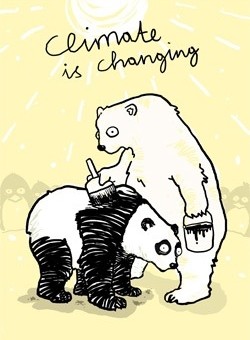Beyond the knotty dung-drops happening right now — another shooting, closing arguments in the Derek Chauvin murder trial, Republicans whining about Maxine Waters talking truth, a drone flight on Mars, and so forth — a major event in the battle against climate change happens this week when the world is supposed to come together to see if they can get their shit together to stop a building catastrophe
Last month, Joe Biden sent out invites to 40 world leaders for the virtual Leaders Summit on Climate scheduled for this Thursday and Friday, underscoring Biden’s grasp of the horrifying predicament facing the planet as global warming continues to lurch out of control. Among a shitload of moves in addressing the issue, he named John Kerry as Special Presidential Envoy for Climate, a cabinet position as member of the National Security Council (first time ever).
According to the White House statement on the conference:
The Leaders Summit on Climate will underscore the urgency — and the economic benefits — of stronger climate action. It will be a key milestone on the road to the United Nations Climate Change Conference (COP26) this November in Glasgow.
In recent years, scientists have underscored the need to limit planetary warming to 1.5 degrees Celsius in order to stave off the worst impacts of climate change. A key goal of both the Leaders Summit and COP26 will be to catalyze efforts that keep that 1.5-degree goal within reach.
The Summit will also highlight examples of how enhanced climate ambition will create good paying jobs, advance innovative technologies, and help vulnerable countries adapt to climate impacts.
A good move in the right direction, with sane Americans way-favoring the climate fight, but alas, as with masks, vaccinations, gun control and a shitload of other serious subjects, Republicans are anti-humanity (h/t tweet Daily Kos):
% saying we should address climate change "right now":
Democrats 80%
Independents 55%
Republicans 29% https://t.co/igQXqPx9vd— Kabir Khanna (@kabir_here) April 18, 2021
Some background on the Summit via Climate Home News this morning:
Pete Ogden, of the UN Foundation and a former senior director on climate under Barack Obama, described the summit as “the most anticipated global climate moment since the Paris Agreement” was adopted in 2015.
“This summit is not an end-point, but it is a very important opportunity for re-alignment [with the Paris goals] and to make some real progress. The US and their [2030 climate plan] being a part of that,” he told reporters last week.
US climate envoy John Kerry has been travelling the four corners of the globe to drum up support for the summit.
While Japan, South Korea and Canada have indicated they are willing to pledge deeper emissions cuts, Kerry was met with resistance by China and India, while a deal with Brazil on halting deforestation in the Amazon won’t land this week.
…
The US is widely tipped to announce plans to cut its emissions 50-percent by 2030, compared to 2005 levels.
This lags behind Europe but could spur other large emitters to raise their game.UN secretary general Antonio Guterres told Reuters the move “will have very important consequences in relation to Japan, in relation to China, in relation to Russia” and other nations which aren’t on track to halve their emissions.
Japan and Canada are the most likely candidates to join the “50-percent club” on Thursday, with South Korea tipped to follow later in the year.
Jake Schmidt, managing director of the international programme at the Natural Resources Defense Council (NRDC), said all “must rise to the moment” and commit to get halfway to net zero emissions by the end of the decade.
Major point is that we have to way-cut emissions way-down to stop the worse aspects of climate change from destroying the world — no shit.
And seemingly right on time, another fucked climate-change report — from the Guardian, also this morning:
There was a “relentless” intensification of the climate crisis in 2020, according to the UN’s World Meteorological Organization.
The coronavirus pandemic made the accelerating impacts of global heating even worse for millions of people.
But the temporary dip in carbon emissions due to lockdowns had no discernible impact on atmospheric concentrations of greenhouse gases, the WMO report said.Last year was ranked as the hottest on record, in a tie with 2016 and 2019, despite the cooling effect of the cyclical natural climate phenomenon, La Niña.
Without this, 2020 would most likely have been the hottest year yet.
The decade 2011-20 was the hottest on record.Extreme weather events broke records across the world, from hurricanes and cyclones in the US and India, heatwaves in Australia and the Arctic, floods in large parts of Africa and Asia, and wildfires in the US.
“All the key climate and impacts information in this report highlight relentless, continuing climate change, an increasing occurrence and intensification of extreme events, and severe losses and damage, affecting people, societies and economies,” said Petteri Taalas, the WMO secretary general.
…
Richard Allan, a professor of climate science at the University of Reading in the UK, said: “What is notable is an emerging picture that climate change is gathering pace: [ice is] melting more quickly and heat is accumulating more rapidly in the ocean, while CO2 increases, which are driving these changes, are becoming progressively larger over time.”Prof Chris Rapley, at University College London, UK, said: “The 1.5C Paris guard-rail is close to being breached. The way we are running human affairs is destabilising the climate system, with predictable and increasingly dire consequences. It’s time for an uprising of concerted action to fix politics — managing the climate crisis will follow.”
In the heat of the day and night — will the GQP kill us all?
 (Illustration by Handoko Tjung, found here).
(Illustration by Handoko Tjung, found here).